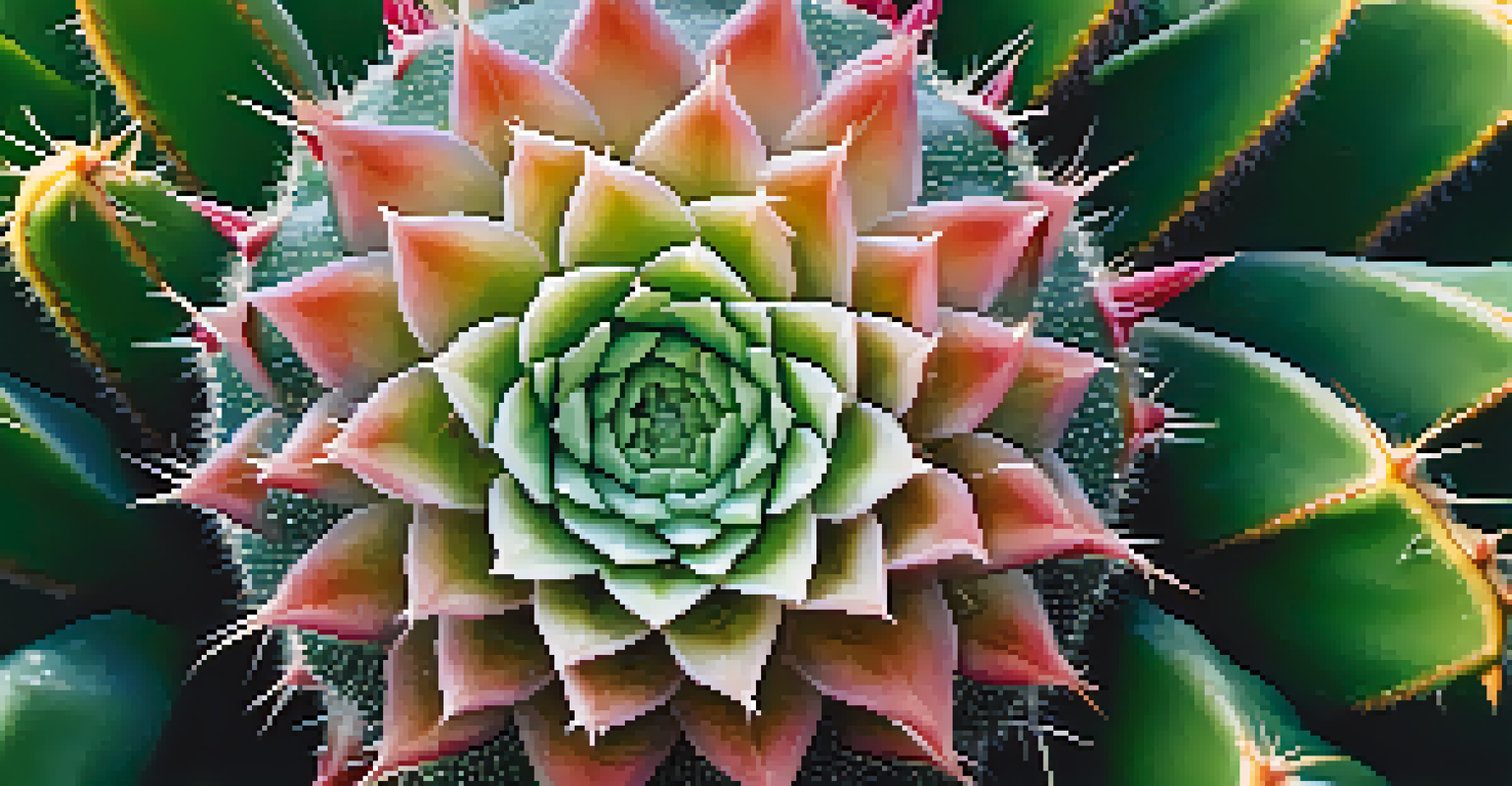The Intersection of Peyote Use and Environmental Spirituality

Understanding Peyote: A Sacred Cactus
Peyote, a small cactus native to Mexico and the southwestern United States, has been used for centuries in various spiritual and religious practices. This tiny plant holds significant cultural importance, especially among Indigenous communities who regard it as a vehicle for spiritual journeying and enlightenment. The psychoactive compound mescaline found in peyote induces altered states of consciousness, allowing users to connect deeply with themselves and their surroundings.
The earth does not belong to us: we belong to the earth.
For many, consuming peyote is not just about the experience; it's a ritualistic practice that fosters a profound connection to nature. This connection reflects a broader belief in environmental spirituality, where nature is seen as sacred and deserving of respect. By engaging with peyote, individuals often report heightened awareness of their place within the ecosystem and a strengthened commitment to environmental stewardship.
Thus, peyote serves as more than just a tool for personal insight; it becomes a bridge to understanding larger ecological relationships. The use of peyote encourages an appreciation for the intricate web of life that sustains us all, emphasizing the importance of protecting our natural world.
The Role of Environmental Spirituality
Environmental spirituality emphasizes the interconnectedness of all living beings and the intrinsic value of nature. This philosophy advocates for a harmonious relationship between humans and the environment, encouraging practices that nurture the Earth. Spirituality in this context often involves recognizing the spirit in nature, seeing it as a source of wisdom and guidance.

Many practitioners find that their spiritual beliefs compel them to advocate for environmental protection. This connection to the land can inspire individuals to engage in conservation efforts, sustainable living, and advocacy for policies that safeguard natural habitats. The emotional and spiritual ties to the Earth often motivate a deeper commitment to ecological causes.
Peyote's Cultural and Spiritual Role
Peyote serves as a vital tool for spiritual journeying and environmental stewardship among Indigenous communities.
When individuals engage with peyote in this spiritual framework, they may emerge with a renewed sense of purpose. The experience can transform their understanding of nature, leading them to act as stewards of the environment, driven by a sense of responsibility and reverence.
Cultural Significance of Peyote Rituals
Peyote rituals are deeply embedded in the cultural practices of several Indigenous peoples, particularly the Huichol and the Native American Church. These ceremonies often involve communal gatherings where individuals partake in peyote to facilitate healing, guidance, and connection to the divine. The rituals emphasize gratitude toward the Earth and its resources, reinforcing the idea of reciprocity in nature.
We won't have a society if we destroy the environment.
During these ceremonies, participants often express their intentions to protect the environment, acknowledging their dependence on the land for spiritual and physical sustenance. The ritualistic use of peyote becomes a means of honoring the Earth, as participants collectively focus on their responsibilities to preserve it for future generations. This communal aspect amplifies the spiritual connection many feel toward the environment.
Thus, peyote rituals not only serve personal spiritual goals but also foster a collective awareness of ecological issues. They highlight the importance of cultural traditions in environmental advocacy, reminding us that spirituality and nature are intertwined.
Peyote and the Modern Environmental Movement
In recent years, the modern environmental movement has increasingly recognized the value of Indigenous practices, including peyote use, in fostering a sustainable future. Many environmental activists advocate for integrating traditional ecological knowledge with contemporary conservation efforts. This collaboration can provide unique insights into how to live sustainably with the land, drawing upon centuries of experience.
As awareness grows, more people are exploring peyote not only for its psychoactive effects but as a means to enhance their environmental consciousness. By participating in or learning about peyote rituals, individuals can gain a deeper understanding of the land's significance, encouraging a more profound appreciation for biodiversity and the need for conservation.
Environmental Spirituality Connection
Engaging with peyote fosters a deeper understanding of our relationship with nature and encourages ecological advocacy.
This intersection of peyote use and environmental activism illustrates that spiritual practices can play a vital role in shaping our relationship with nature. The lessons learned from these experiences can empower individuals to take action in their communities and advocate for the planet.
Challenges Facing Peyote and Its Users
Despite its rich cultural significance, the use of peyote faces numerous challenges. Overharvesting, habitat loss, and climate change threaten the survival of this sacred cactus, raising concerns about its future availability for Indigenous communities. Moreover, the increasing popularity of peyote among non-Indigenous users can further strain its populations, leading to ethical questions about cultural appropriation.
Many Indigenous leaders emphasize the importance of protecting peyote as a cultural and ecological resource, advocating for sustainable harvesting practices. They highlight the need for legal protections that recognize the sacredness of peyote while ensuring its preservation for future generations. This struggle underscores the tension between traditional use and modern demand.
Addressing these challenges requires a collaborative approach, where Indigenous voices are prioritized in discussions about peyote conservation. By supporting Indigenous rights and sustainable practices, we can help safeguard this important plant while respecting its cultural significance.
Personal Experiences with Peyote and Nature
Many individuals who have engaged with peyote report transformative experiences that deepen their connection to nature. These personal journeys often involve vivid imagery, insights about life, and a strong feeling of oneness with the Earth. Such experiences can evoke a sense of responsibility, prompting individuals to seek ways to care for the environment.
For some, these experiences serve as a wake-up call, highlighting the urgent need to address environmental issues. Participants may leave their peyote experiences with a renewed sense of purpose, inspired to make lifestyle changes that promote sustainability. This personal transformation can ripple outward, influencing friends, family, and communities.
Challenges in Peyote Conservation
Overharvesting and climate change threaten peyote's availability, highlighting the need for sustainable practices and Indigenous rights.
Sharing these stories can also help bridge the gap between traditional peyote use and contemporary environmental activism. By connecting personal insights with collective action, individuals can inspire others to engage with nature in more meaningful ways.
The Future of Peyote and Environmental Spirituality
Looking ahead, the future of peyote and its relationship with environmental spirituality will depend on our collective actions today. As awareness of the environmental crisis grows, so too does the understanding that spirituality can play a crucial role in fostering a sense of stewardship. By integrating peyote use into our environmental practices, we can cultivate a deeper respect for nature.
Furthermore, the ongoing dialogue between Indigenous communities and modern environmental movements can lead to innovative solutions for conservation. Collaborative efforts that honor traditional knowledge while embracing scientific research can create a more holistic approach to environmental protection. This synergy can enhance our ability to address pressing ecological challenges effectively.

Ultimately, the intersection of peyote use and environmental spirituality highlights the need for a more profound connection to the natural world. By embracing these teachings, we can foster a culture of respect and care for the planet, ensuring that both peyote and our ecosystems thrive for generations to come.